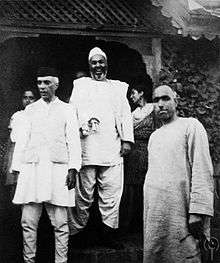Abdul Samad Khan Achakzai
| Abdul Samad Khan Achakzai عبدالصمد اڅکزی | |
|---|---|
 Khan with Jawaharlal Nehru and Sheikh Abdullah in 1946. | |
| Born |
Abdul Samad Circa. 7 July 1907 Inayat Ullah Karez, Gulistan, Balochistan, British Raj |
| Died |
2 December 1973 Quetta, Pakistan |
| Cause of death | Assassination |
| Resting place | Inayat Ullah Karez, Gulistan, Balochistan |
| Nationality | Pakistani |
| Other names | Khan Shaheed |
| Citizenship | Pakistani |
| Occupation | Politician |
| Known for | Political activism |
| Home town | Quetta |
| Successor | Mahmood Khan Achakzai |
| Political party | Pakhtunkhwa Milli Awami Party |
| Religion | Islam |
| Spouse(s) | (two spouse) |
| Children | Muhammad Khan Achakzai, Ahmed Khan, Bibi Khor, Mahmood Khan Achakzai, Hamid Khan Achakzai |
| Parent(s) | Nur Mohammad Khan |
Abdul Samad Khan Achakzai (circa. 7 July 1907 – 2 December 1973) (Pashto: عبدالصمد خان اڅکزی) was a Pashtun nationalist and political leader from Quetta, Pakistan.
Early life
Achakzai was born on 7 July 1907 at Gulistan, near the city of Quetta in undivided British India. At age 13 Samad was inspired to lead a school student procession to protest against British imperialism in Afghanistan as well as in favor of the "Khilafat" Movement in India. The student procession went well and without violence as Samad firmly believed in non-violence as demonstrated by his political career. His successful student procession at Gulistan however provoked the Quetta-based Political Agent of the Raj. Samad was reprimanded. His parents were warned against Samad's semi-political activity believed to be prejudicial to the British Baluchistan. This political activity led to Samad's first prison term as a political prisoner in Quetta prison for 28 days.
Career
He became the founder and head of Anjuman-i-Watan, Wror Pashtoon and Pakhtunkhwa National Awami Party. He was repeatedly imprisoned for 35 years both by the British Raj and the Pakistani government for secessionist activities. During the Indian independence movement, Anjuman-i-Watan was first political organ in Balochistan launched by Khan. He was a member of the Congress party in the Balochistan area of British India, and campaigned for Pashtun autonomy in a united secular India, along with Khan Abdul Ghaffar Khan (Bacha Khan) in the then North-West Frontier Province. A follower of Mohandas Gandhi, he was known by many as the "Baloch Gandhi". He was a member of the National Awami Party (NAP), before forming a breakaway Pakhtunkhwa National Party and later on Pakhtunkhwa Milli Awami Party. He was member of the Balochistan Provincial Assembly at the time of his assassination in December 1973. After Samad Khan's demise, his son Engineer Mahmood Khan Achakzai was elected the chairman of the party.[1]
References
- ↑ Talbot, Ian (1998). Pakistan, a modern history. Palgrave Macmillan. p. 377.
External links
![]() Media related to Abdul Samad Khan Achakzai at Wikimedia Commons
Media related to Abdul Samad Khan Achakzai at Wikimedia Commons